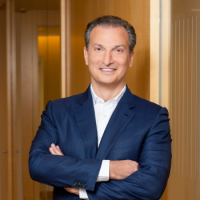The Role of the Private Sector in Geopolitics: A Conversation with George Logothetis
What role does, and should, the private sector play in geopolitical affairs? The private sector and market-based solutions have the power to drive economic growth and innovation, but they also have the potential to influence geopolitics at large, including advancing democracy and human rights. The nexus between governments and the private sector could assist in lifting lives, providing opportunity, and achieving a prosperous future.
Join us for this conversation between former President of Colombia Iván Duque and Executive Chairman of Libra Group George Logothetis on the power of the private sector and its connection to foreign affairs, especially dealing with economic challenges and opportunities in Latin America, Europe, and the Middle East.
Select Quotes
H.E. Iván Duque Márquez
Chair and Distinguished Fellow, Iván Duque Center for Prosperity and Freedom, Wilson Center
President of the Republic of Colombia (2018-2022)
"70% of the people in the planet today as we speak, are governed by authoritarian regimes. The sad part of that story is that 15 years ago it was 48%.”
George Logothetis
Executive Chairman, Libra Group
“There’s an invisible war going on between elements of the West and elements of the East. That invisible war has been invisible to most people for some decades now because it’s been fought through cyber, through intelligence services, trade policy and the like. All of a sudden there are now two wars…on the Eastern front of the Western world. So all of a sudden it’s gone from invisible to visible."
Speakers

President of the Republic of Colombia (2018-2022)

Introduction

Hosted By

Global Europe Program
The Global Europe Program is focused on Europe’s capabilities, and how it engages on critical global issues. We investigate European approaches to critical global issues. We examine Europe’s relations with Russia and Eurasia, China and the Indo-Pacific, the Middle East and Africa. Our initiatives include “Ukraine in Europe”—an examination of what it will take to make Ukraine’s European future a reality. But we also examine the role of NATO, the European Union and the OSCE, Europe’s energy security, transatlantic trade disputes, and challenges to democracy. The Global Europe Program’s staff, scholars-in-residence, and Global Fellows participate in seminars, policy study groups, and international conferences to provide analytical recommendations to policy makers and the media. Read more


Middle East Program
The Wilson Center’s Middle East Program serves as a crucial resource for the policymaking community and beyond, providing analyses and research that helps inform US foreign policymaking, stimulates public debate, and expands knowledge about issues in the wider Middle East and North Africa (MENA) region. Read more


Wahba Institute for Strategic Competition
The Wahba Institute for Strategic Competition works to shape conversations and inspire meaningful action to strengthen technology, trade, infrastructure, and energy as part of American economic and global leadership that benefits the nation and the world. Read more



